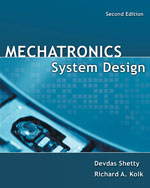-
- Simulation and Real time interfacing using National Instrument's LabVIEW has been used in addition to VisSim by Virtual Simulation Inc.
Numerous design examples and end-of-chapter problems have been added to help students understand basic mechatronics methodology.
A simple motion control example which is carried out over the 8 chapters allows progressive coverage of the different elements of mechatronics systems.
Current trends in mechatronics and smart manufacturing are presented in the first chapter.
Illustration of block diagram approach and emphasis on the comprehensive use of mathematical analysis, simulation and modeling, control and real time interfacing in implementing case studies.
Expanded coverage of sensors, real time interfacing, multiple input and multiple output systems.
- Document History
- Subscribe to RSS Feed
- Mark as New
- Mark as Read
- Bookmark
- Subscribe
- Printer Friendly Page
- Report to a Moderator
- Subscribe to RSS Feed
- Mark as New
- Mark as Read
- Bookmark
- Subscribe
- Printer Friendly Page
- Report to a Moderator
| Description | Book Information |
|---|---|
This text by Shetty and Kolk, blends the pertinent aspects of mechatronics--system modeling, simulation, sensors, actuation, real-time computer interfacing, and control--into a single unified result suitable for use in the college-level mechatronic curriculum. Students are introduced to all the topics needed to develop a good understanding of the basic principles used in mechatronics technology through the use of examples, problems and case studies, all of which can be quickly and affordably assembled and investigated in laboratory settings. Core aspects are combined with practical industrial applications and are presented in an opitimal way for understanding. The book features extensive coverage of the modeling and simulation of physical systems made possible by block-diagrams, the modified analogy approach to modeling, and state-of-the-art visual simulation software. A collection of case studies drawn from a variety of industries (complete with parts, lists, setup, and instructions) are used to support the authors' applied, design-oriented approach. Readers of this text will be equipped with all the tools necessary to plan, test, and implement a well-designed mechatronic system. New to this Edition : Table of Contents What is Mechatronics? Integrated Design Issues in Mechatronics. The Mechatronics Design Process. Mechatronics Key Elements. Applications in Mechatronics. Summary. References. Problems.2. MODELING AND SIMULATION OF PHYSICAL SYSTEMS Operator Notation and Transfer Functions. Block Diagrams, Manipulations, and Simulation. Block Diagram Modeling—Direct Method. Block Diagram Modeling—Analogy Approach. Electrical Systems. Mechanical Translational Systems. Mechanical Rotational Systems. Electrical–Mechanical Coupling. Fluid Systems. Summary. References. Problems. Appendix to Chapter 2.3. SENSORS AND TRANSDUCERS Introduction to Sensors and Transducers. Sensitivity Analysis—Influence of Component Variation. Sensors for Motion and Position Measurement. Digital Sensors for Motion Measurement. Force, Torque, and Tactile Sensors. Vibration—Acceleration Sensors. Sensors for Flow Measurement. Temperature Sensing Devices. Sensor Applications. Summary. References. Problems.4. ACTUATING DEVICES Direct Current Motors. Permanent Magnet Stepper Motor. Fluid Power Actuation. Fluid Power Design Elements. Piezoelectric Actuators. Summary. References. Problems.5. SYSTEM CONTROL—LOGIC METHODS Number Systems in Mechatronics. Binary Logic. Karnaugh Map Minimization. Programmable Logic Controllers. Summary. References. Problems.6. SIGNALS, SYSTEMS, AND CONTROLS Introduction to Signals, Systems, and Controls. Laplace Transform Solution of Ordinary Differential Equations. System Representation. Linearization of Nonlinear Systems. Time Delays. Measures of System Performance. Root Locus. Bode Plots. Controller Design Using Pole Placement Method. Summary. References. Problems.7. SIGNAL CONDITIONING AND REAL TIME INTERFACING Introduction. Elements of a Data Acquisition and Control System. Transducers and Signal Conditioning. Devices for Data Conversion. Data Conversion Process. Application Software. Summary. References.8. CASE STUDIES Comprehensive Case Studies. Data Acquisition Case Studies. Data Acquisition and Control Case Studies. Summary. References. Problems.APPENDIX 1 DATA ACQUISITION CARDS APPENDIX 2 STRAIN GAUGE EXPERIMENT for Additional Case Studies. | |
 | |
Authors and Organization:
| |
| Publisher: Cengage Learning | |
| Copyright Year: 2010 | |
| Edition: 2 | |
| ISBN-10: 143906198X | |
| ISBN-13: 978-1439061985 | |
Summary of How NI Technology is Used: Simulation and real-time interfacing examples. | |
| |
